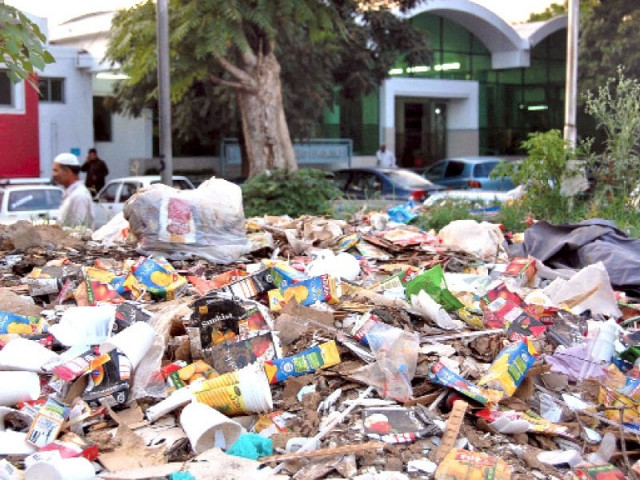Failed attempts: A new campaign, but will Isloo become any cleaner?
Past attempts put an ominous cloud over the latest one.

The G sectors seem to be one of the biggest casualties of litter. PHOTO: MUHAMMAD JAVAID/EXPRESS
The Capital Development Authority (CDA) has launched a fresh campaign aimed at improving the fast deteriorating state of cleanliness in Islamabad.
On Thursday, CDA started an anti-littering campaign in sector I-9. Though it is not the first time the authority has tried its hand at preventing littering, CDA spokesperson Ramzan Sajid said this campaign will be different from previous efforts.
“We are targeting areas that have the poorest cleanliness conditions,” Sajid said. “The campaign has started from I series sectors and we will move to the G series.”
The G sectors seem to be one of the biggest casualties of litter. Anyone who thinks Islamabad is a clean city needs to take a walk around sector G-7/4.
There, little children play in streets lined with litter. Discarded plastic bags are as ubiquitous in this area as the grass that grows along the sector’s asphalt roads. Even the trash dumpster placed outside the nearby football ground has boiled over. Ironically, the CDA headquarters are also located in the same sector.
Muhammad Bashir, a resident of G-7/4, sounded frustrated when he talked about the extent of litter in the sector.
“We have complained to the CDA several times, but to no effect,” Bashir said.
On Thursday, at the launch of the new campaign, CDA Chairperson Syed Tahir Shahbaz talked about community participation to overcome the littering monster.
“It is our collective responsibility to keep our houses, streets and sectors clean, which would enable us to transfer this asset of clean Islamabad to the next generation,” Shahbaz said.
But Bashir said residents were already trying.
“The CDA’s sanitation staff only picks up those items from the trash that are of value to them,” he said. “The rest of the cleaning is left to us and we can only do so much.”
Litter is also a common sight in Karachi Company, sector G-9’s main market.
Plastic bags, wrappers, juice boxes and discarded packing material from fruit and vegetable crates line the pavement edges outside the shops and the median strips at frequent intervals.
Waqar Ahmed, who works at a shoe store in the market, said the shops owners try to clean the pavements outside their individual shops but the litter is constantly generated by other sources.
“It is mostly due to the fruit and vegetable carts and the kiosks,” he said. “It’s embarrassing for us that there’s so much waste lying around the market.”
In their latest campaign, Sajid said the CDA staff will go “door-to-door”, telling shopkeepers, kiosk owners and residents to leave the trash in front of their establishments and homes instead of discarding it elsewhere, so the staff can pick it up the next day.
He said the CDA is starting the campaign in “low gear” and will build momentum slowly.
In contrast, the civic agency launched an aggressive campaign in April 2011 to stop people from littering through educational material and by imposing fines.
That campaign started as a pilot project in the markets of sectors F-6, F-7 and F-10. The campaign was built around section 5(29) of the Environmental Protection Regulations, which criminalises littering in the federal capital with a maximum fine of Rs300.
An anti-litter task force was established to impose on-the-spot cash fines ranging from Rs50 to Rs300 on residents caught littering. Even today, the 12-member task force is stationed at the three pilot sectors, with four members at each sector looking out for littering incidents from morning to 1pm.

The campaign was supposed to be extended to all Islamabad sectors. That never happened.
Members of the anti-litter task force lament the lack of organisational support, understaffing and a habitual culture of littering among residents. They say they are often threatened, ridiculed or teased by the violators if they issue a ticket for littering.
The task force has issued fines worth Rs28,500 since the enforcement began in October 2011, according to statistics provided by the CDA. Fines of Rs300 were only issued on three or four occasions during this time, Sajid said, while around 540 residents have been fined Rs50 for littering during the campaign.
Now CDA has revised its focus to clean the streets first instead of penalising the residents.
Sustainability is vital to the effectiveness of any cleanliness project in the city, and Asif Shuja, director general of Pakistan Environmental Protection Agency (PAK-EPA), thinks “administrative changes” are a big hurdle.
“We worked on the anti-litter campaign closely with former chairman Kamran Lashari and additional secretary Imtiaz Inayat, who later became chairman CDA himself, but then he too was replaced and the campaign lost momentum,” Shuja said.
Shuja is aware that the plastic bags are one of the major items littering Islamabad’s streets.
In fact, the environmental agency has devised a regulation to ban plastic bags within the limits of the capital. The regulation is waiting approval from the Ministry of Climate Change, he said.
“When the regulation is enforced no one will be able to manufacture, sale or use plastic bags in Islamabad,” he said. “Instead, people will be requested to use oxo biodegradable bags that naturally decompose within three to four months.”
Back in Karachi Company, as Ahmed expresses his disappointment over the poor state of cleanliness, right in front of his shop, a man with a long white beard leans out of a car’s window and drops what looks like a disposable white paper plate on the road.
It remains to be seen whether the CDA’s latest attempts at anti-littering will be able to convert this man.
Published in The Express Tribune, January 4th, 2013.


















COMMENTS
Comments are moderated and generally will be posted if they are on-topic and not abusive.
For more information, please see our Comments FAQ